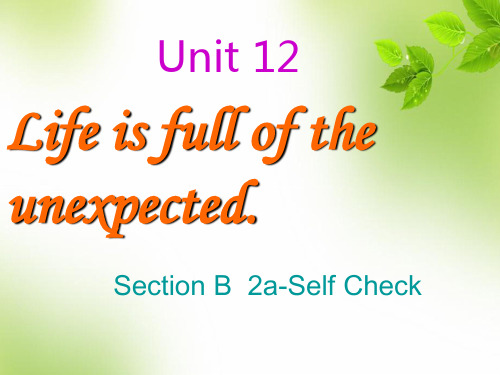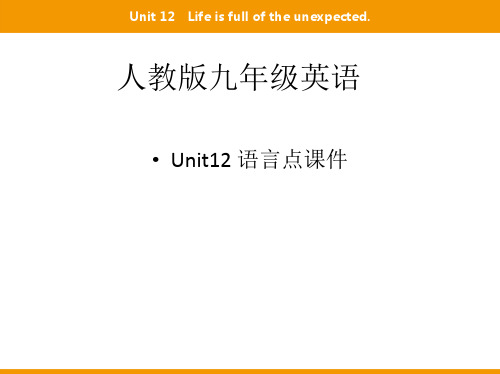人教版九年级英语12单元2b知识点
人教版英语九年级Unit12 Section B 知识点讲解

After that, We had a P.E. class .Although I like P.E. very much,I was very hungry and couldn't do any exercise.
Finally, when I got back home after school, I was very tired and hungry,because I ate nothing all day.
A. given out B. looked out C. sold out D. come out
7.— How many people were invited to the meeting?
— About six ____. A. hundred B. hundreds C. hundred of D. hundreds of
• costume n.(特定场合穿的)服装;装束 • costume party化装舞会
• embarrass v. 使尴尬→embarrassed adj.窘 迫的; 尴尬的(用来修饰人)
Unit12知识点人教版英语九年级全册

Unit 12[Section A(1c)]1.Life is full of the unexpected. 生活充满了意外。
the unexpected 为名词化的形容词,意为“出乎意料的事”。
英语中,有些形容词与定冠词the连用,表示一类人或事物,在句子中起名词的作用。
eg:the homeless (无家可归者) the disabled(残疾人)the unwanted( 无人认领物品)2.When I got to school, I realized I ____________ my backpack at home. 当我到学校时我意识到我把书包忘在家里了。
表示“把某物忘在某处”要用词组leave sth. +地点。
forget意为“遗忘某物”,指忘记一件具体的东西,但不能有具体的地点。
eg:I left my book on the desk.我把书忘在了桌子上。
eg:I forgot my umbrella yesterday.我昨天忘了带伞。
[Section A(2d)]1. My alarm clock didn’t go off!我的闹钟没响。
go off意为“发出响声”。
eg:Something was wrong with my alarm clock and it didn’t go off.我的闹钟出毛病了,它没有响。
拓展:⑴go by意为“(时间)过去;消逝”。
eg:Time goes by second by second.时间一秒秒地消逝。
⑵go on意为“继续”。
eg:Please go on working.请继续工作。
2.Carl’s dad saw me on the street and gave me a lift in his car.Carl的爸爸在街上看到我,捎了我一程。
give sb.a lift是动词短语,意为“捎某人一程”,相当于give sb.a ride/give a ride to sb. eg:I’m a little late,can you give me a lift,dad?我要迟到了,你能捎我一程吗,爸爸?[Section A(3a)]1.I was about to go up when I decided to get a coffee first.我正打算上楼,这时我决定先去喝杯咖啡。
人教版九年级英语u12知识点

人教版九年级英语u12知识点Unit 12 is an important unit in the curriculum of the ninth-grade English textbook published by the People's Education Press. In this unit, students will learn about different subjects and academic performance through conversations, articles, and activities. The unit provides a comprehensive understanding of academic life and encourages students to reflect on their own learning experiences. In this article, we will delve deeper into the knowledge points covered in Unit 12.Firstly, this unit introduces various subjects taught in schools, such as Mathematics, English, Science, and Physical Education. Through dialogues and reading materials, students can practice using adjectives to describe their preference for different subjects. This not only helps them to develop their vocabulary skills but also encourages them to express their opinions in a coherent manner.Additionally, the unit focuses on academic achievements and progress. It teaches students how to discuss their school performance using comparative and superlative forms. This enables students to construct meaningful sentences to compare their achievements with others and to evaluate themselves effectively. Moreover, they learn expressions that provide positive feedback and encouragement to their classmates, fostering a supportive learning environment.Furthermore, the unit includes a section on sharing study tips and advice. Students are encouraged to share their personal experiences and strategies for studying effectively. Through peer discussions and group activities, students can gain insights into effective learning techniques and develop their problem-solving skills. This not only enhances their understanding of the language but also promotes critical thinking and collaboration.Moreover, the unit explores the concept of intelligence and multiple intelligences theory. Students learn about different types of intelligence, such as linguistic, logical-mathematical, musical, spatial, bodily-kinesthetic, interpersonal, and intrapersonal intelligences. By understanding this theory, students can appreciate the diversity of talents and skills among individuals. This knowledge empowers themto recognize and nurture their own strengths, leading to increased self-confidence and motivation in their academic pursuits.Additionally, the unit introduces the concept of goal setting and developing effective study habits. Students learn the importance of setting realistic goals and formulating action plans to achieve them. They are encouraged to identify their weaknesses and seek strategies to overcome challenges. By understanding the importance of perseveranceand self-discipline, students can develop good study habits that will benefit them not only academically but also in their future endeavors.In conclusion, Unit 12 of the ninth-grade English textbook published by the People's Education Press covers a wide range of knowledge points related to academic subjects, achievements, study tips, intelligence, and goal setting. Through engaging materials and activities, students can enhance their language skills while developing important life skills. By exploring these topics, students gain a deeper understanding of their own academic journey and are equipped with the tools and strategies to excel in their studies.。
人教版九年级下册英语Unit 12 单元语法知识梳理

过去完成时师院附中李忠海1.过去完成时的意义过去完成时表示在过去某个时间或某个动作之前发生的动作或存在的状态,它表示动作发生的时间是“过去的过去”,它是一种相对于一般过去时的时态,没有一般过去时就没有过去完成时。
2.过去完成时的构成过去完成时的谓语由“助动词had+动词的过去分词”构成。
否定式为“had not+动词的过去分词”, had not缩写为hadn't。
3.过去完成时的用法(1)表示一个动作或状态在过去某一时间或动作之前已经完成,即发生在“过去的过去”。
这个过去的时间可以用by, before等介词短语或者一个时间状语从句来表示。
例句:When I woke up, it had stopped raining. 我醒来时,雨已经停了。
(2)表示某一动作或状态在过去某时之前已经开始,一直延续到这一过去的时间。
常用表延续的时间状语如by the end of+过去的时间点, by the time +从句等。
例句:By the end of last year, she had worked in the factory for twenty years. 到去年年底,她已经在这家工厂工作20年了。
4.过去完成时的判断依据(1)由时间状语来判定一般说来,各种时态都有特定的时间状语。
与过去完成时连用的时间状语有:①by+过去的时间点例句:She had finished reading the book by 9 o'clock yesterday. 到昨天9点钟时,她已经读完了这本书。
②by the end of+过去的时间点例句:We had completed all the work by the end of last month. 到上个月月底,我们已经完成了所有工作。
(2)由“过去的过去”来判定过去完成时表示“过去的过去”,指过去某一动作之前已经发生或完成的动作,即动作有先后关系,动作在前的用过去完成时,在后的用一般过去时。
九年级下册英语第12单元Section-B-2

It's impolite to laugh at, stare at or play ___C__on disabled people A. fun B. jokes C. tricks D. parts
3. Many people ran to their local supermarkets to buy as much spaghetti as they could. 很多 人跑到当地的超市抢购尽可能多的意大利面条。
He described where they had landed and told how they were moving across the United States. Welles made it sound so real that hundreds of people believed the story, and fear spread across the whole country. By the time police officers announced that the story was a hoax, thousands of people had left their homes.
One April Fool’s Day, a reporter in England announced that there would be no more spaghetti because the spaghetti farmers in Italy had stopped growing spaghetti. Many people ran to their local supermarkets to
buy as much spaghetti as they could. By the time people realized that the story was a hoax, all of the spaghetti across the country had been sold out. In another famous trick a TV show in England reported the discovery of special water. They said this water would help people lose weight and that one customer had already lost a lot of weight in just four months. By the end of the day, more than
最新人教版九年级unit 12英语知识点

最新人教版九年级unit 12英语知识点随着时间的推移,英语已经成为一门国际化的语言。
学习英语对于我们提高自身的语言能力、拓宽视野和增加交流的机会有着重要的作用。
而在学习英语的过程中,掌握语法知识点是非常重要的。
现在,让我们来看看最新人教版九年级unit 12的英语知识点。
一、单词认识在学习任何一门语言时,掌握单词是基础。
单词能够帮助我们表达自己的思想和感受,扩展我们的词汇量。
在本单元中,我们需要掌握一些新的单词,如familiar, destroy, event, harvest等。
我们可以通过读书、听音乐、看电影等方式来加深对这些单词的印象。
二、短语搭配在学习英语的过程中,短语的使用也是必不可少的。
熟练掌握常用的短语能够帮助我们更好地表达自己的意思。
在本单元中,我们需要掌握一些重要的短语搭配,如pose a threat, take action,make a difference等。
通过大量的练习和实际运用,我们可以更好地理解和掌握这些短语。
三、语法结构语法是学习英语非常重要的一部分。
正确使用语法可以使我们的表达更加准确和流利。
在本单元中,我们将学习到一些重要的语法结构,如虚拟语气中的if条件句,比较级和最高级等。
这些语法结构与我们日常生活息息相关,我们可以通过大量的练习来巩固和掌握它们。
四、阅读理解阅读是学习英语的一种非常有效的方式。
通过阅读,我们可以了解不同的观点和思想,拓宽我们的视野。
在本单元中,我们将阅读一些关于环境保护和自然灾害的文章。
通过阅读并回答问题,我们可以提高我们的阅读理解能力和提高我们的写作水平。
五、写作表达写作是语言学习的重要组成部分。
通过写作,我们可以提高我们的思维和组织能力。
在本单元中,我们将学习如何写作一篇有关环境保护的英语作文。
我们可以从保护自然环境、减少污染、节约资源等方面展开思考和表达。
通过写作,我们可以更好地理解和应用我们所学的知识。
六、口语表达口语是学习英语的重要组成部分。
人教版九年级英语Unit12单元知识点课件

Unit 12 Life is full of the unexpected.
栏目索引
adj. 有活力的;情绪饱满的 Ed was alive with happiness. 埃德高兴得眉飞色舞。
adj. 仍然存在的
We should keep some good traditions alive. 我们应该继承一些好的传统。
例 (2018安徽合肥五十中西校期中)To be honest, I was so surprised that
Unit 12 Life is full of the unexpected.
栏目索引
时,主句用现在进行时;while引导的从句通常用过去进行时。
When I arrived home my mother was cooking in the kitchen. 当我到家的
时候,我妈妈正在厨房做饭。
Unit 12 Life is full of the unexpected.
人教版九年级英语
栏目索引
• Unit12 语言点课件
Unit 12 Life is full of the unexpected.
栏目索引
Unit 12 Life is full of the unexpected.
Section A
例 (2017湖北武汉中考)Even though we're in difficult times, we need to
keep hope
.
A.real B.alive C.fresh D.close 解析 四个选项的含义分别是:real真正的;alive活着的,有活力的,仍然
存在的;fresh新鲜的;close靠近的,亲近的。根据本题语境可知,尽管我们
Unit12SectionB(2a-2e)课件+2023-2024学年人教版九年级英语全册

any of these stories?
3.Which of these stories is _th_e__le_a_s_t_b_e_l_ie_v_a_b_l_e_/the most
The next day the bookshops sold out. 第二天书店就卖断了货。
All the tickets for the last performance
have sold out already. 最近一场演出的票已经全部卖光。
【拓展】out 构成的短语: give out 分发 hand out 分发 work out 得出结果 run out of 用完 go out 出去 find out 查明 look out 当心 take out 拿出
as much…as possible/sb. can
7. 全国 across the country 8. 被卖光 be sold out
9. 发现特殊的水
discovery of special water
10.减肥 lose weight 11.仅在四个月里 in just four months 12.当天结束之前 by the end of the day
5.announce 作及物动词,意为“宣布; 述说; 声称”,侧重预报人们所关心或 感兴趣的事情,尤指新闻之类的消息。
如:Our manager announced that he would take charge of it. 我们经理宣布说他将负责此事。
- 1、下载文档前请自行甄别文档内容的完整性,平台不提供额外的编辑、内容补充、找答案等附加服务。
- 2、"仅部分预览"的文档,不可在线预览部分如存在完整性等问题,可反馈申请退款(可完整预览的文档不适用该条件!)。
- 3、如文档侵犯您的权益,请联系客服反馈,我们会尽快为您处理(人工客服工作时间:9:00-18:30)。
人教版九年级英语12单元2b知识点Unit 12 Lesson 2B: Knowledge Points
In this lesson, we will explore the knowledge points covered in Unit 12 Lesson 2B of the 9th-grade English textbook by People's Education Press. We will delve into various concepts and ideas that are essential for a better understanding of the English language. Let's get started!
1. Vocabulary Expansion:
One crucial aspect of learning any language is expanding vocabulary. This lesson introduces us to several new words and expressions. It is essential to familiarize ourselves with them to enhance our communication skills. Some of the words we encounter in this lesson include "ignite," "approachable," and "unforgettable." By incorporating these words into our daily conversation and writing, we can enhance our fluency and diversify our language usage.
2. Grammar: Modal Verbs:
Modal verbs play a significant role in English grammar, expressing possibility, ability, necessity, and permission. In this lesson, we come across modal verbs such as "can," "could," and "may." Understanding their usage can help us convey our thoughts accurately. For example,
"can" is used to express general ability, while "could" is used for specific past ability. "May" is often used to seek permission or express possibility. Mastering modal verbs can enhance our language proficiency and enable us to communicate effectively.
3. Listening Comprehension:
Listening skills are essential for effective communication in any language. This lesson includes a listening comprehension exercise to help us improve our listening abilities. By carefully listening to the audio and understanding the context, we can develop our comprehension skills. Additionally, this exercise helps us become familiar with different accents and adjust our listening accordingly - an essential skill in today's globalized world.
4. Reading Comprehension: Context Clues:
Understanding the meaning of unfamiliar words while reading is crucial. In this lesson, we encounter unfamiliar words and phrases, and the context clues provided in the text help us decipher their meanings. By paying attention to the surrounding words and sentences, we can make educated guesses about the meaning of unknown vocabulary. This skill not only enhances our reading comprehension but also helps in building our vocabulary.
5. Writing Practice: Descriptive Writing:
Descriptive writing is an integral part of English language skills. It allows us to vividly paint a picture with words, engaging the reader's senses. In this lesson, we are encouraged to write a descriptive paragraph on a memorable experience. By employing appropriate adjectives, strong verbs, and sensory details, we can bring our experiences to life on paper. This exercise improves our writing skills and enables us to express ourselves more effectively.
6. Translation: Translating Sentences:
Developing translation skills can help bridge the gap between different languages and facilitate communication. This lesson provides us with a sentence translation activity, where we are required to translate English sentences into Chinese. By accurately conveying the meaning and nuances of the original sentence, we sharpen our language understanding and ensure effective communication between English and Chinese languages.
In conclusion, Unit 12 Lesson 2B of the 9th-grade English textbook offers valuable knowledge points to enhance our language skills. From expanding vocabulary to mastering grammar, listening comprehension, reading comprehension, writing, and translation, each aspect plays a significant role in our language development. By focusing on these
knowledge points and practicing them regularly, we can strengthen our English proficiency and become confident communicators in the language.。
